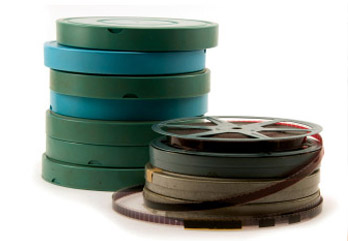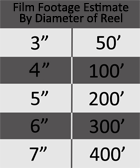Your Super 8, 8mm, and 16mm film is truly precious and must be preserved. Let us take that box full of reels and make a beautiful, permanent, useful, shareable digital file archive of your film…safely, locally, by hand. Our highly trained technicians in Southern California will also revitalize the images and bring them back to life with our professional, studio quality color correction.

 Home movie film is typically measured by the foot. To get the approximate footage of your reel, you first must measure the diameter of your reel. Most of the consumer format reels we see are about 3 inches in diameter, which are 50 feet long. Use the chart to the right to figure out the approximate footage of your film. Unsure of what kind of film you have? Take a glance at our film conversion chart.
Home movie film is typically measured by the foot. To get the approximate footage of your reel, you first must measure the diameter of your reel. Most of the consumer format reels we see are about 3 inches in diameter, which are 50 feet long. Use the chart to the right to figure out the approximate footage of your film. Unsure of what kind of film you have? Take a glance at our film conversion chart.